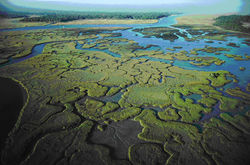Spatial Planning and Integrated Coastal Zone Management
Coastal and marine environments are usually characterized by beautiful landscapes and rich ecosystems of great importance, offering elements such as rich biodiversity. They also attract human activities such as tourism and industrial uses. However, the co-existence of human activities and natural resources often creates conflicts of use in the coastal zone.
Management policies are an important means of implementing planning in order to minimise, prevent or resolve use conflicts. The development of a coastal and marine spatial planning system presents an opportunity for the implementation of an overall strategy of conservation, sustainability and management to maximise future economic profit.
Contents
Spatial Planning
Previously, the role of spatial planning focussed intensively on economic and social development. Gradually, environmental dimensions were taken into account, especially through the appearance of sustainable development in environmentally important areas. Spatial planning in Europe promotes environmental sustainability, examining the concept of development which meets environmental, social and economic needs of present and future generations as well as policy and planning instruments to promote such development. It also encourages spatial integration of development perspectives demonstrating how social cohesion, regional innovation and sustainable development can interplay in real planning situations, using policies and planning tools, such as Environmental Impact Assessment and European Spatial Development Perspective.
Through the use of Geographical Information Systems (GIS), spatial planning has been used to define and map coastal and marine areas. It is essential to examine not only environmental impacts of individual activities but to research cumulative effects of multiple activities occurring in an area. Mapping coastal and marine areas in detail allows the opportunity to identify those areas at particular risk from possible pollution or excessive disturbance and to examine in detail how many activities are occurring.
Integrated Coastal Zone Management
Integrated Coastal Zone Management (ICZM) is a dynamic, continuous and iterative process designed to promote sustainable management of coastal zones. ICZM projects cover various geographical areas, from local regions to spatially extensive coastal areas. The “Integrated” in ICZM refers both to the integration of objectives and to the integration of the multiple instruments needed to meet these objectives. ICZM includes the integration of all relevant policy areas, sectors, and levels of administration as well as the terrestrial and marine components of the geographical area under consideration. The word 'Integrated' also refers to four types of integration: spatial, temporal, vertical and horizontal.
Comparing Spatial Planning and Integrated Coastal Zone Management
A common goal of spatial planning and ICZM is to define, develop and protect coastal zones; ICZM is most common at the local scale while spatial planning is often applied at larger scales. Both share policies with the same goal, the resolution of land use conflicts for the development and conservation of coastal and marine environment. Spatial planning at the national level is essential in order to examine the impact of human activities in urban and regional coastal zones. Coastal Zone Management is becoming increasingly necessary because of the increasing importance of coastal and marine exploitation/development and protection.
An enabling environment at the European level could provide the framework in which countries can develop more appropriate integrated coastal zone management policies, including investment strategies, integrated development plans (spatial and functional) and resource management strategies.
The most important issue for both spatial planning and ICZM are the effective and successful implementation of planning systems and policies as well as a better understanding and definition of coastal and marine areas. A common perspective of European coasts must be adopted in order to improve management and planning of activities in coastal and marine areas.
Related articles
Please note that others may also have edited the contents of this article.
|
